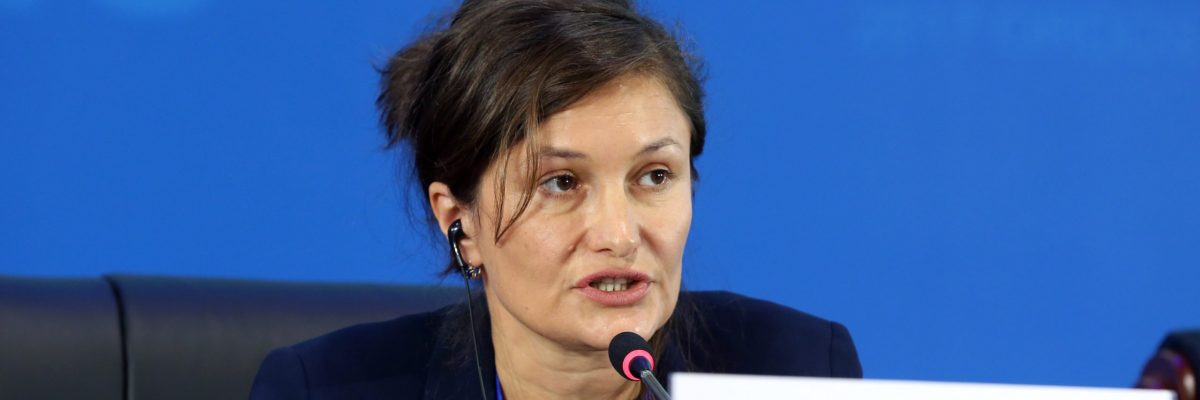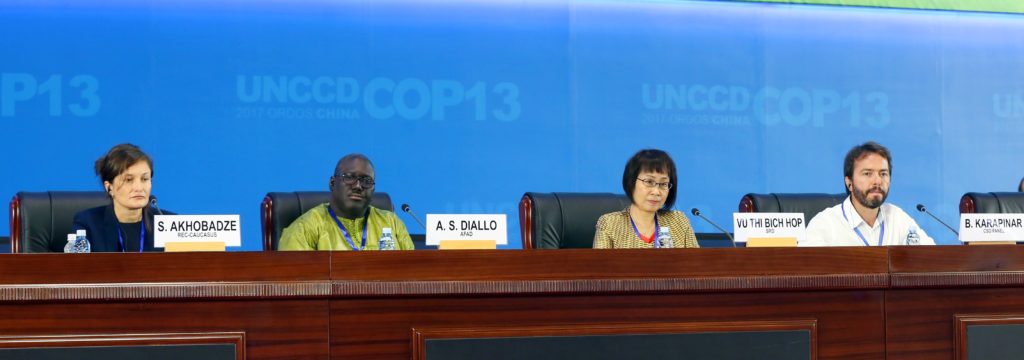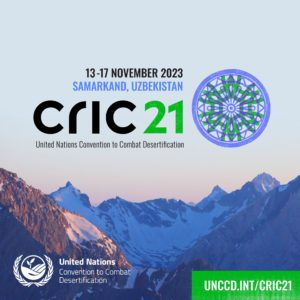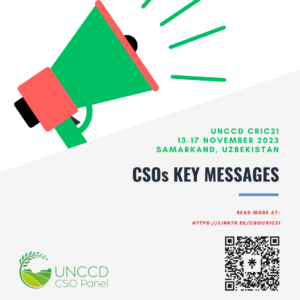Open dialog session on land and climate with CSOs
The CSO network, those accredited with the UNCCD, has been strengthening during last couple of years and coming forward to implement the convention enthusiastically. Consequently, the number of CSOs accredited to the UNCCD has now reached almost 500. Ms. Monique Barbut, the executive secretary of the UNCCD, told this while addressing the plenary session on open dialogue with the CSOs. She emphasized the vital role played by the CSOs in the implementation of the UNCCD and LDN.
Assoc. Prof. Baris Karapinar, also the representative of WEOG region in the CSO panel, stated that the science of climate change and land degradation is clear, and even more importantly, there is an enormous gap between what needs to be done and what is being done on the ground. He further reiterated that CSOs contribute enormously to the objectives of the Convention. They develop successful projects on both adaptation and mitigation at the local level.
Furthermore, Mr. Ahmed Sekou Diallo from Africa presented a project implemented in Mali and explained how effectively CSOs help raise awareness among local communities.
Ms. Vu Thi Bich Hop from Asia described the experience of her organization’s reach out to 33,000 farmers on various issues related to climate change and improving sustainability in water, energy and food related fields.
Mr. Juan Riet from GRULAC shared their experience on improving water problem and food security of more than 1 million rural dwellers.
In addition to those, Ms. Sophiko Akhobadze speaking on behalf of EEOG talked about how to downscale international LDN targets to the local level, while improving the livelihoods of farmers, and women in particular.
Also, Mr. Robert Tansey, on behalf of the WEOG and advisor at the Nature Conservancy and Mr. Andrew Lesa, representative of the Youth from New Zealand shared their important experiences.
Finally, several country delegates commented on what have been shared, some verbalizing their support implicitly. All in all, the session showed that more efforts need to be put, and it should be strategically, for successful lobbying during COP13 and beyond.
CST discussion on the work of SPI
SPI’s existence and work were at the core of CST discussion on 8 September, Friday. Delegates welcomed the outcomes and recommendations of the internal assessment made by SPI. They underlined some concerns mainly related to the involvement of ST correspond to the SPI’s work and, increasing exchange between all stakeholders; the need to build on outputs and results issued from the work of other international platforms in order to not re-invent the wheel as well as the need to fill the financial gap.
ICARDA recommended to enhance SPI collaboration with scientific institutions and proposed that CGIAR would be accepted as a member observer. Meanwhile, civil society reminded of their wish to seize the opportunity to increase the number of observers so as to improve non-State actors’ involvement in SPI’s work.
SPI work program for 2018-2019 was appreciated by Delegates who expressed their concern to give more attention to drought and sand storms issues in the SPI work.
Civil society expressed its concern over local action and local actors while elaborating on orientations of Parties to achieve their LDN target.
The knowledge hub of UNCCD was welcomed by delegates who underlined the need to better manage the different kind of information available on the platform, and to make it a platform to access national reports, as far as it is possible, and to allow Countries to update their national reports timely. The delegates recommended that scientific documents elaborated by CSO Forum be uploaded on the Knowledge Hub. They also highlighted WOCAT contribution to best practices and indigenous knowledge sharing.
The next CST meeting was convened on 9 September 2017, in order to adopt its report to COP.
Appel à l’action: En faveur de la nouvelle generation
Pour la première fois, le 5ème jour de la COP 13, dans l’histoire la Convention de l’UNCCD, plus d’une centaine représentants des “jeunes” du monde, appelé future “GREEN CHAMPION” sont venus avec enthousiasme lancer le débat a la COP13. Ils ont partagé les expériences nationales et les leçons apprises. Le jour suivant, ils vont élaborer ensemble leurs messages pour adresser aux délègues des Etats présent a la négociation. Autant de discours ont été entendus, depuis la cérémonie d’ouverture.
Plusieurs messages qui font appel au changement, et que ce soit Xu Xiao, Président de la Fédération des Association des Jeunes de la CHINE, que ce soit la Secrétaire Exécutif, Mme Monique Barbut de l’UNCCD à fortement marteler de la nécessite d’avoir des ambitions, et encore plus du courage à l’endroit de la nouvelle génération. La Société civile, acteur stratégique dans la mise en œuvre de la COP, a apprécie les valeurs et la noblesse de ces communications. Par contre, elle souhaite que les discours de tous les intervenants soient accompagnés par des actions concrètes sur le terrain.
En somme, les stratégies et les plans d’actions qui seront mis en œuvre permettront-elles d’atteindre les objectifs de l’ODD 15 ? Et associer d’avantage les jeunes renforcera-t-il nos capacités de réalisation afin d’assurer la durabilité pour les nouvelles générations ? L’histoire nous dira…







